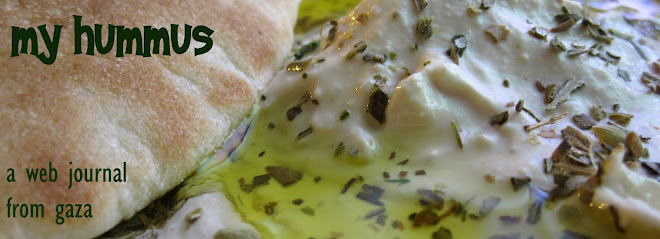 I grew up drinking "Jugo de Maracuya"-- Passion Fruit Juice. When I first came to Gaza I discovered that it grew here. Recently it seems to be back in season, and later I found out there are 2 seasons for passion fruit in this region. I have gone wild buying up the Passion Fruit while it lasts- since I have to say it is one of my favorite fruity delicacies- and at least it is a flavor from home.
I grew up drinking "Jugo de Maracuya"-- Passion Fruit Juice. When I first came to Gaza I discovered that it grew here. Recently it seems to be back in season, and later I found out there are 2 seasons for passion fruit in this region. I have gone wild buying up the Passion Fruit while it lasts- since I have to say it is one of my favorite fruity delicacies- and at least it is a flavor from home.In Arabic they call it "Flora"- but other than farmers, nobody seems to know what it is. I tell them it grows in Gaza, and people refuse to believe it. I brought some in to work to share and explained then people in Gaza seem to believe it has aphrodisiac effects. I told them, I'm not going to explain that word-- google it. So they did on handy dandy Google translate and the jaws that dropped were priceless.
Someone left a bag of mint and passion fruit on my desk this afternoon, not sure who it was, but it was certainly a special surprise.
Curiosity spurred, and wanted to look up passion fruit and see what the deal was behind the name.
Turns out the name "Passion Fruit" comes from a religious background that came from Catholic Missionaries who believe that parts of the fruit bore religious connections, it was a way of illustrating the Crucifixion:
- "The three stigmas were to reflect the three nails in Jesus's hands and feet.
- The threads of the passion flower were believed to be a symbol of the Crown of Thorns.
- The vine's tendrils were likened to the whips.
- The five anthers represented the five wounds.
- The ten petals and sepals regarded to resemble the Apostles (excluding Judas and Peter)."
Funny huh?
It was first documented in Peru in 1569 by a doctor named Monardes who took it back to be used for herbal tea.

yay! that must have been so exciting! dude when I found LULO, MORA AND MARACUYA I think I almost cried of joy. Now my fridge is always filled with it! It's not the actual fruit...but its the closes second I can have: frozen pulp!! but I had no idea of the religious background, thats crazy, considering how catholic Colombia is and how prevalent maracuya is. so according to it's religious history...is it a good thing or a bad thing to eat it?
ReplyDelete